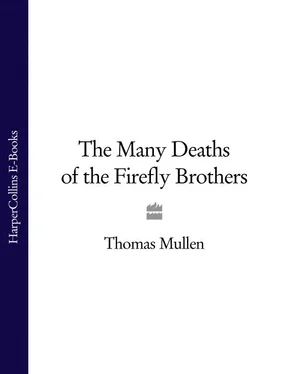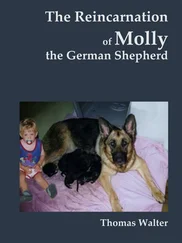1 ...7 8 9 11 12 13 ...25 “Sammy, go to the kitchen,” she said. Her fingers grasped the back of one of the chairs, tiny muscles and cracked nails. Once the living room was free of children, she said, “I’m glad you two are okay. But I don’t want you scaring the boys.”
“We didn’t say anything scary, June,” Jason said.
“They’ve had enough experience with death,” she continued as if she hadn’t heard him. “I don’t want you telling them any stories.”
June’s attitude toward them had changed over time. Where others saw the Firefly Brothers’ acts as brazen, heroic counterpunches thrown at a broken system, June seemed to view them as just another symptom of that brokenness. Her husband, Joe, had been a war vet like Pop, but so different from straitlaced Pop in every other way. Joe had sneaked Jason his first sips of beer, tossed a baseball with him at the family gatherings Pop never attended because “someone needs to keep the shop open,” even covered for Jason with a few lies to Pop when Jason started working for a local bootlegger. As a kid, Jason had loved being around Uncle Joe, and it had taken him years to understand why a guy told so many stories, why a guy so desperately needed to hear other people laugh, why the approval of a teenager could be so important to a young man.
Joe lost his factory gig four years ago, about the same time Pop was arrested, so his private battles with underemployment and the bottle had been eclipsed by Pop’s trial. Joe had been more bitter and less sober every time Jason saw him, to the point that Jason wasn’t surprised when he learned that Joe had died in a late-night auto wreck somewhere between Lincoln City and Cincinnati—just one more tragedy to lump in with all the others. The only mystery was whether Joe was killed coming home drunk or while trying to run away.
In the early days after Joe’s death, Jason understood yet was annoyed by June’s sudden lionization of her departed husband. The Joe she had once cursed for being lazy and insufficient was now a wonderful husband unfairly wronged by misfortune. Death had bestowed a kind of nobility upon him. More recently, however, her love for Joe seemed to mingle with anger at Jason and Whit, distaste for their ability to succeed in the world where her husband had failed. Joe had been “an honorable man,” she noted one night when the brothers were in town. He had made some mistakes, but at least his had been legal and honest. That had not been a pleasant dinner.
Though June refused to take money directly from her bank-robbing nephews, Jason knew that she took plenty secondhand, through Ma. Poverty deprives its sufferers of the freedom to act on grudges.
“We won’t be here long, June,” Whit said.
She gave them a look, and for a moment Jason could see a flicker of the pain that her anger tried to snuff out. “They’re good kids,” she said. “I don’t want them—”
“Neither do we,” Jason said. “Neither do we.”
An hour later, the three Fireson brothers and Ma were sitting at the table when the telephone rang. Conversation stopped and they all looked at one another, motionless, as if the telephone were a predator.
At the third ring, Jason tried to dispel the tension by telling his mother, “It’s all right, you can answer it.”
She picked up the receiver. “Hello?…Yes, this is Margaret Fireson…Yes, of course, I remember you, Sergeant Higgins.” Jason and Whit exchanged glances, neither of them knowing that name. Their mother was silent a long while, her expression confused. She had been staring at the floor, but now her gaze shifted to Jason and Whit. “Of course,” she said suddenly, as if she hadn’t realized it was her turn. “That’s fine…Goodbye.”
“What is it?” Jason asked after she hung up.
“It was the Points North police. He said that someone has…stolen your bodies. Souvenir hunters—he referred to them as morbids. ‘Some morbids must have taken them.’ He assured me that he would find the… bodies, and have them shipped to the funeral home of my choice. He said he’d call again once he’d tracked them down.”
“Crazy people out there,” Jason said, calmly threading a finger through the handle of his coffee cup. “Poor fools got the wrong bodies.”
It was decided that the Firesons—those publicly known to be alive, that is—should go about their day as they would normally be expected to. June’s boys cleaned the house while June stayed upstairs, sewing and doing needlework for the Salvation Army. Playing the role of grieving mother, Margaret stayed home, too, and as more calls trickled in from friends who’d read the paper she stoically accepted their condolences. At Jason’s behest, she refused their kind offers to visit, deliver food, clean the house. If she sounded somewhat less mournful than the friends had expected, perhaps they assumed she was still in shock. But after the fourth such call she found it difficult to feign sorrow, and allowed herself such comments as “Well, I’m not sure I believe all this, you know. My boys are smart, maybe there’s something fishy about these stories.” Her friends doubtless pitied her for being in denial.
Weston, who seemed to be living at home again, told the brothers he had been given the day off but had some errands to run. On his way out the door, he crossed paths with Jason in the front parlor.
“Listen, Wes,” Jason said quietly, remembering their last conversation a few days ago. “I wanted to talk to you about something.”
Weston just nodded and seemed suddenly nervous, even scared.
“I’m sorry for some of the things I said that night,” Jason said. He wasn’t good at this. “It was a…a bad time. I didn’t mean all that.”
Weston nodded again, as if he hoped he could nod this all away, all the bad blood between them, without having to utter a word.
“I know you’ve been under a lot of pressure, being the only one who’s home,” Jason continued, “looking after Ma and June. I know I can be a lousy brother sometimes. But what me and Whit do…It’s a little bit easier knowing that you’re here, you know?”
Weston’s eyes filled again. Jason hadn’t known how his judgmental brother would respond to his apology, but he hadn’t expected this. It only made him feel worse.
“You’re a good brother, Wes.”
Weston folded his arms, hugging himself, and his neck hung down for a moment. He wiped at his eyes and looked up again.
“Thanks, Jason. I’m sorry, too.”
“It’s been a hard time, I know.” He put a hand on Weston’s shoulder, squeezed. “But we’re all going to be okay, you understand? We’re going to stick together.”
“Yeah.” Weston stared at the floor. “I know we will.”
New facts emerged after Darcy’s third drink. The words on the newspapers danced for her now, up and to the right as if hoping to escape her gaze. Damned words, always running from you. Always hiding things. She stared and stared and even with her eyes wet she insisted on wrenching every last bit of truth from the stories before her.
Rain splashed through the window she had shattered with a highball glass. Thunder rolled over Lake Michigan and crashed upon the city. It was midmorning yet the skies were dark with the wrath of an afternoon storm, nature itself confused, nothing making sense.
She had tried to call Veronica, but there was no answer. She had even used her own telephone, which Jason had forbidden for sensitive calls. But would the police still be monitoring her now? She had tried other numbers, dialing safe houses and the brothers’ sundry associates, but the few people who answered insisted they didn’t know anything. She felt that she didn’t know anything, no matter how many times she read the stories. And something akin to fear, tainted with guilt, kept her from dialing Mrs. Fireson in Lincoln City. How could Darcy talk to the mother of two dead sons? Would she somehow be blamed?
Читать дальше












